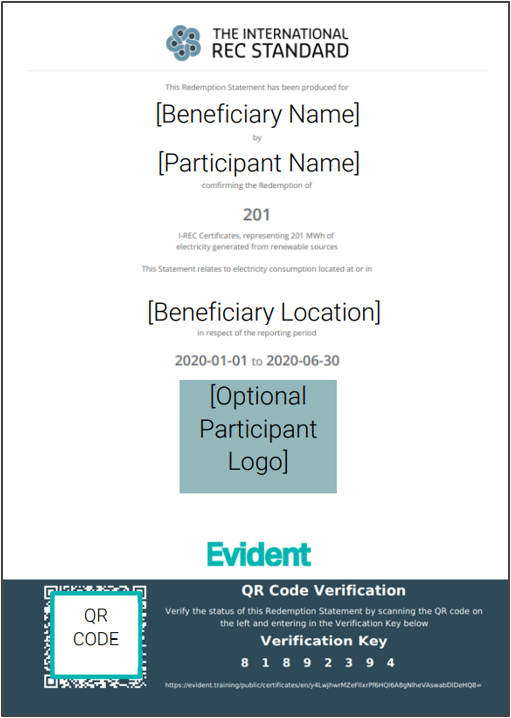Introduction
In the quest for a sustainable future, companies worldwide are striving to achieve net zero emissions. This ambitious goal involves balancing the amount of greenhouse gases emitted into the atmosphere with an equivalent amount removed or offset. One of the key tools in this effort is the International Renewable Energy Certificate (I-REC). I-RECs play a crucial role in helping companies reduce their carbon footprint, support renewable energy development, and meet compliance and sustainability goals. This article explores how I-RECs contribute to achieving net zero and the benefits they offer to businesses and the environment.
What Are International Renewable Energy Certificates (I-RECs)?
International Renewable Energy Certificates (I-RECs) are market-based instruments that certify the generation of one megawatt-hour (MWh) of electricity from renewable energy sources. These sources include wind, solar, hydro, and biomass. When a renewable energy facility generates electricity, it can issue I-RECs, which can then be sold to companies or individuals looking to claim the environmental benefits of renewable energy.
Each I-REC contains information about the type of renewable energy, the location of the generation facility, and the time of generation. This detailed information ensures that renewable energy is accurately tracked and verified, providing a credible and transparent way for companies to support renewable energy and reduce their carbon footprint.

Reducing Scope 2 Emissions with I-RECs
One of the primary advantages of I-RECs is their role in reducing Scope 2 emissions. Scope 2 emissions are indirect emissions from the consumption of purchased electricity, heat, and cooling. By purchasing I-RECs, companies can claim that the electricity they use is offset by renewable energy, effectively lowering their Scope 2 emissions to zero. This is a significant step toward achieving net zero, as it directly addresses one of the largest sources of carbon emissions for many organizations.

Supporting Renewable Energy Development
The purchase of I-RECs not only helps companies reduce their emissions but also supports the development of renewable energy projects. The revenue generated from selling I-RECs provides financial support to renewable energy producers, encouraging investment in new projects and the expansion of existing ones.
This financial support is crucial for the growth of the renewable energy sector. Developing renewable energy projects often requires significant upfront investment, and the sale of I-RECs provides an additional revenue stream that can make these projects more viable. As more companies purchase I-RECs, the demand for renewable energy increases, leading to more projects and a greater share of renewable energy in the overall energy mix.
Global Flexibility and Reach
One of the significant advantages of I-RECs is their global reach and flexibility. Companies can purchase I-RECs from renewable energy projects worldwide, allowing them to support renewable energy development regardless of their geographical location. This flexibility is particularly beneficial for multinational corporations with operations in multiple countries.
For instance, a company headquartered in Europe with operations in Asia and the Americas can purchase I-RECs from renewable energy projects in these regions, aligning its renewable energy procurement with its global operations. This approach ensures that the company’s energy consumption across all locations is covered by renewable energy, enhancing its sustainability credentials.
The ability to source I-RECs globally also means that companies can support renewable energy development in regions where it may have the most significant impact. For example, purchasing I-RECs from projects in developing countries can provide much-needed financial support to these regions, promoting sustainable development and reducing poverty.
Compliance and Sustainability Reporting
I-RECs also help companies meet compliance and sustainability reporting requirements. Many regions have regulations that mandate a certain percentage of energy consumption come from renewable sources. By purchasing I-RECs, companies can comply with these regulations and avoid potential penalties. Additionally, I-RECs align with sustainability reporting standards like the Global Reporting Initiative (GRI) and the Carbon Disclosure Project (CDP), providing credible evidence of renewable energy usage and enhancing a company’s sustainability credentials.
Enhancing Corporate Social Responsibility (CSR) and ESG Goals
Incorporating I-RECs into a company’s sustainability strategy demonstrates a strong commitment to corporate social responsibility (CSR) and environmental, social, and governance (ESG) goals. This commitment can significantly boost a company’s brand image and reputation. Consumers and investors are increasingly favoring companies that prioritize sustainability and environmental stewardship. By supporting renewable energy through I-RECs, companies can attract environmentally conscious customers and investors, setting themselves apart from competitors.
Financial and Brand Benefits
Investing in I-RECs can also lead to direct financial benefits. Companies that demonstrate a strong commitment to sustainability are more likely to attract investment from ESG-focused funds. Furthermore, a sustainable brand image can drive consumer preference, leading to increased sales and customer loyalty. Employees, too, are more likely to feel engaged and motivated working for a company that aligns with their values, improving retention and overall job satisfaction.
Practical Steps to Implement I-RECs
- Assess Energy Consumption: Determine the total electricity consumption of your company to understand how many I-RECs you need to purchase.
- Choose I-REC Providers: Partner with reputable I-REC providers to ensure the certificates you purchase are verified and credible.
- Purchase and Retire I-RECs: Buy the necessary I-RECs and retire them to claim their environmental benefits.
- Integrate into Reporting: Incorporate your I-REC purchases into your sustainability reporting to showcase your commitment to renewable energy.
- Communicate Efforts: Publicize your renewable energy purchases and their impact to stakeholders, enhancing your CSR and ESG profiles.
Conclusion
Achieving net zero emissions is a challenging but essential goal for companies dedicated to sustainability. I-RECs provide a practical and effective tool to help companies reduce their carbon footprint, support renewable energy development, and meet compliance and reporting requirements. By integrating I-RECs into their sustainability strategies, companies can demonstrate their commitment to a greener future, improve their brand image, and contribute to the global effort to combat climate change.
Embrace the power of I-RECs to drive your company toward net zero and make a lasting impact on the environment. The journey to sustainability starts with one megawatt-hour at a time, and I-RECs are your pathway to a cleaner, greener future.
About GreenUP
Pioneering the Green Transition with Expertise and Innovation. With over 10 million I-RECs issued since 2019, we are Vietnam’s leaders in renewable energy certification. Our comprehensive suite of services, positions us uniquely as a one-stop solution for all your green and ESG needs. Experience unparalleled market access, competitive pricing, and strategic partnerships that drive not only cost savings but also significant value to your sustainability goals.
References
- Liang, L. (2024) Renewable energy certificates, defying criticism, take off in Southeast Asia. Eco-Business. [Online] Available at: https://www.eco-business.com/news/renewable-energy-certificates-defying-criticism-take-off-in-southeast-asia/
- Gooding, C. (2023) The Promise of Tracking Renewable Energy Development. Arab Gulf States Institute in Washington. [Online] Available at: https://agsiw.org/the-promise-of-tracking-renewable-energy-development/
- Naik, G. (2021) Problematic corporate purchases of clean energy credits threaten net zero goals. S&P Global. [Online] Available at: https://www.spglobal.com/esg/insights/problematic-corporate-purchases-of-clean-energy-credits-threaten-net-zero-goals
- Upadhyay, N.K. (2023) International Renewable Energy Certificates: The I-REC Standard (Part I). cCarbon. [Online] Available at: https://www.ccarbon.info/article/international-renewable-energy-certificates-the-i-rec-standard-part-i/
- International Tracking Standard Foundation (n.d.) Homepage. Available at: https://www.trackingstandard.org/







